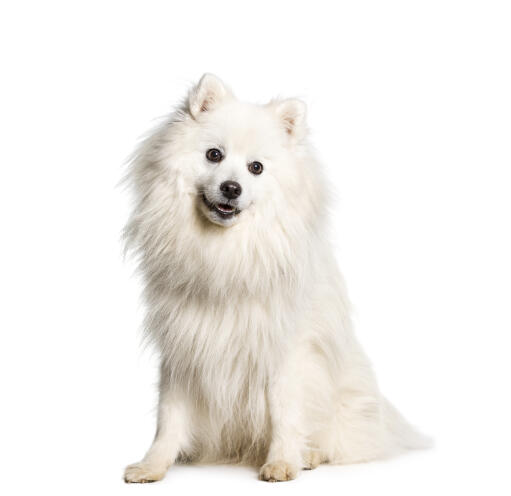Japan-Spitz










Geschichte
The exact origin of the Japanese Spitz is unknown. One theory is that is descends from selected small Siberian Samoyeds, bred for miniaturisation, but this has not been proven. At one time their numbers were very high in Japan, but less so today. They are becoming more popular in Europe and across North America and are slightly larger than their Pomeranian cousins. They were bred as a companion dog and pet.
Verhalten
The Japanese Spitz is an alert, friendly dog, well suited to family life. They are affectionate with everyone they meet and are good with children. They make good watchdogs and will bark when someone is at the door. If socialised from a young age they are fine with strangers coming into the house and rarely territorial. Some are reserved with strangers at first, but soon become friendlier when settled. They are devoted and loyal to their family and dislike being left out of family activities; they will want to be in the thick of daily life. They do need lots of human contact and some can suffer separation anxiety if not left alone for short periods from a young age.
They love nothing better than a game and are particularly playful with children and other dogs. The Japanese Spitz is active and described as a small dog with a large personality. They are intelligent and learn things very quickly. Pleasing their owner makes them happy and they are keen on training as it means that more attention is lavished upon them. They do need consistent training to prevent behavioural problems, such as incessant barking or destructive behaviour. Being confident and taking charge of them will help them fit into the family and prevent future issues.
Games of catch. frisbee and agility competitions are all good ways to keep them active. The Spitz might be a small breed, but they have masses of energy and can play for hours. They will need at least one long daily walk, plus a vigorous play session to tire them out and keep them calm indoors. However, they are adaptable dogs and will fit into most routines. As long as they are with you, they will be happy.
The lovely white coat of the Japanese Spitz does not need masses of attention. As long as they are brushed a few times a week, the coat will require little else. They are very clean dogs and tend not to suffer dog odour. With regular grooming, loose hair should not be a problem in the house. They have dense fur of their feet, so it is best to get them used to having their paws handled from an early age, incase they get things trapped in them.
A pretty sturdy breed that rarely suffers health related issues. Patellar Luxation is seen however, plus some suffer runny eyes due to their small tear ducts/allergies.
Charakter
Japanese Spitz jabe a playful and obedient temperament. They are intelligent little dogs who will respond well to consistent and regular training. They are friendly dogs who will fit well into a family with other pets and/or small children but they can be noisy. The silver lining here is that they make good watchdogs and will alert you to any visitors.
Gesundheitliche Probleme
Health problems that may affect Japanese Spitz include eye disease and luxating patella (dislocation of the kneecap).
Einzelheiten zur Rasse
- Status: Common
- Lebenserwartung: 10 - 16 years
- Gewicht: 5 - 10 kg
- Höhe: 13 - 15"
- Selten: Nein
- Fell: Mittel - Zweifach
- Pflegeanforderungen: Täglich
- Stadt oder Land: Beides
- Mindestanforderungen an Umgebung: Kleines Haus
- Mindestanforderungen an Garten: Kleiner bis mittelgroßer Garten
- Rassetyp: Begleithund
- Größe: Mittel
- Energieniveau: Mittel
- Benötigte Bewegung: Bis zu einer Stunde













